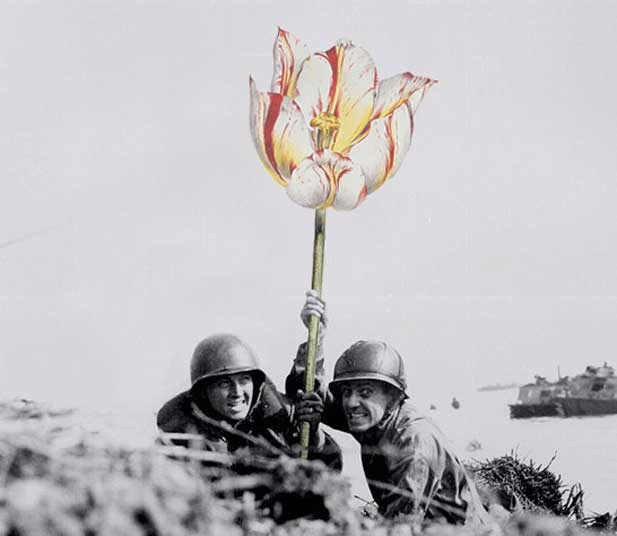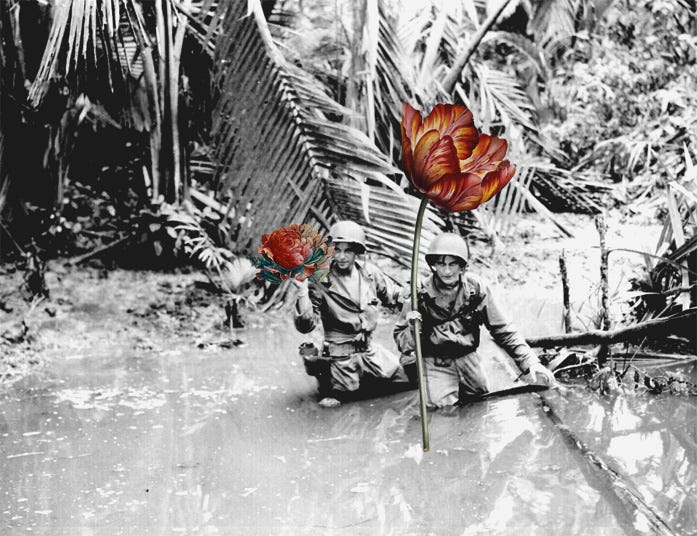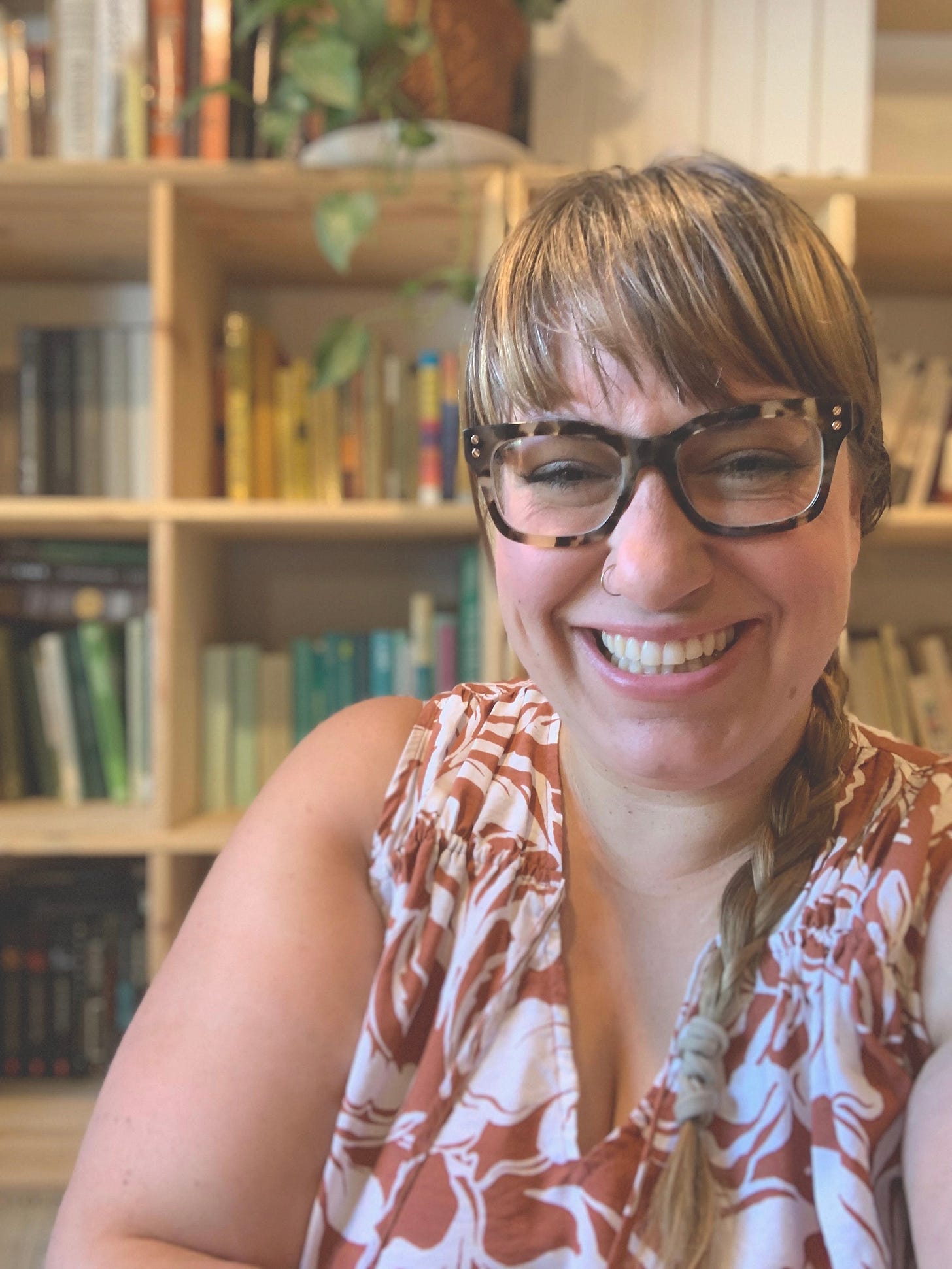the Empathy List #101: A Man in a Wheelchair Gives Up His Guns
Andre Dubus and the Essay that Forever Changed How I think about Gun Control
Hello friend, Liz here.
My kids are home on spring break, which means playdates and library runs and superhero movies and a trip to a nickel arcade in an exhausting and delightful stream, and me, their mother, planning it all with great joy and weariness. :) Basically, I’ve made my own spring break stayvacation for them. Jeremy is still working this week, so as the single member of the party planning committee, it’s on me, and I’m trying to enjoy it.
My children are now eight and ten, in the third and fourth grades respectively. My girl is nearing puberty (or as she once called it “going through sex”), so I’m full of anticipation and attention. I even bought our first family sex talk guide the other day, Sex is a Funny Word by Cory Silverberg and illustrated by Fiona Smyth, a graphic novel that barely covers mechanics, but instead, centers childrens’ feelings and experiences about sex that for them is inescapable in an adult-rated world (looking over a sibling’s shoulder at a “sexy” screen, a kiss scene in a movie, a billboard with cleavage, etc. “Are those things sex?” kids wonder, often not knowing who or how to ask that question). And it comes with discussion questions! Such good ones!1
Anyway, I do not typically write about daily life with my children here, but this week I’m thinking about them and their classmates, and so I wanted to share this bucolic glimpse into my family life before we talk about the BIG STUFF: guns.

The fact is, my kids’ spring break started one day early this year. Their public school district in Colorado offered a “mental health day off” for educators and families due to a SECOND school shooting in two weeks in one of their high schools.
As a writer, I try to stick close to home, so I’m not going to talk about the Nashville private school tragedy today, though it’s on my mind, too.
Instead, I’ll be all eyes on Denver.
The gist: on March 1, a student was shot and killed in the East High school parking lot, shooting one. Then, on March 22, a different student shot and wounded two faculty members with a gun he’d brought to school, shooting two in two weeks.
I won’t go into all the details though they matter profoundly to those most closely connected. (For those who want more, here are those details.)
What I will say is, mass shootings are too common in my state, despite our purple politics. Though most of our blue voters concentrate ourselves in cities, still, the majority of these acts of public violence occur in the most crowded regions so gun control does not seem to be a primary Democratic priority in Colorado.
So it’s a theme I’ve written about before, as it is, unfortunately, a perennial concern for those in my state:
And I’ve laid out my views on gun control here:
However, what I haven’t yet shared here is the essay that changed my mind about guns: “Giving Up the Gun” by Andre Dubus.
I first read “Giving up the Gun” in a creative writing class in college, an assigned reading.
Unlike many in my east coast high school who had ties to the military, my father worked in office buildings in the field of for-profit education. Back then, I didn’t care either way about control or free access to firearms… except that because guns were unfamiliar, I would not have bought one for myself if given the option. I may have shot a rifle at a target at summer camp? Maybe? But we did not have guns at home and, as a family, we had a wariness toward at-home weapons of all kinds.
However, after reading Andre Dubus, I started to think and care very much more. I started paying attention to the news, to the way our country treated guns and gun owners, to the effects of those guns in our society and individually. And I started to doubt whether we’d be better off without them.
But back to the essay.
Published in 1997 in the New Yorker (and behind a pay-wall, though this essay by his son covers the same ground), Andre Dubus detailed a profound change of mind.
Before 1990, author Andre Dubus would have taken up the cause of the NRA. A practicing Catholic and a former Marine, he grew up in the South, where everyone owned a firearm. His father taught him to shoot; the Marine Corps taught him to assume a gun was always loaded and to aim for the enemy. In fact, Dubus’s aim in owning guns was even to “protect other people,” a Good Samaritan in every sense.
And he loved his guns, all eight of them. He especially treasured his twenty-two revolver, his thirty-eight-caliber subnosed revolver, and his three-eighty semiautomatic. He obtained licenses in two states, including a conceal and carry license. He wore a holster at his waist; he even brought his smallest gun along in his jeans pocket, always there on his right hip whenever he left the house to run errands, attend Mass, shop or teach, right there jingling next to his coins and keys and cigarette lighter.
He supposed the act of carrying it—of being prepared for the worst—would prevent him from ever needing to wield it.
But even with these best of intentions, trouble found Dubus.
One day, Dubus came upon a drunk white college kid holding a blade to a black man, pushed against a wall, the white man spewing racist epithets, the opened pocket knife flashing. Out went the gun from Dubus’s pocket. He pointed it, threatened to shoot. The drunk cursed at him, dared him, the drunk man was looking for a fight. But the drunk man’s friends arrived and begged Dubus to leave. Both he and the white man walked away in opposite directions, leaving behind the victim and a crowd, everyone safe but shaken.
After that incident in which the gun seemed to have drawn him into conflict, Dubus felt haunted.
Dubus could now see a particular body in the path of his particular gun.
He could smell the smoke of his bullets colliding with the drunk man’s stomach and shattering the drunk man’s insides, the blood running on the sidewalk, the man’s intestines and skin splattered on the brick behind the body, ejected by the hollow-point bullets flying from the shaft of Dubus’s weapon, propelled by Dubus’s own finger on the trigger.
He wrote, “A young man could be dead because of one moment on a Friday night… That night on the sidewalk, my only instinct had been to aim a gun.”
Yet Dubus’s final moment of decision came after this, in 1990.
He had delayed in giving up his guns because less than a year after the confrontation with the drunk, Dubus stopped to assist a car on the highway after an accident, and another driver hit him. He was paralyzed instantly.
Now bound to a wheelchair, he also began to feel bound to his own fear.
He wondered, what if an intruder approached him and he shot? What if he actually had to use the gun in his pocket—could he live with the consequences of such a choice? Could he live with the anxiety and dread that accompanied the potential scenario with the bad man down and the pistol in his hand?
Until Dubus had lost the capacities he once had, he could not understand the completeness of his own fragility, how even with a gun in his pocket, he could not protect his body or anyone else’s, even the body of an aggressor. He could no longer uphold the illusion of himself as the protector of anyone. And he knew that, either way, he did not want to hold in his own hands the choice between another’s life or death, that the very choice was not meant to be his.
As Dubus put it, “I gave up answers that are made of steel that fire lead, and I decided to sit in a wheelchair on the frighteningly invisible palm of God.”
The Christian faith centers on this vulnerability: we humans are needy. We are insufficient. We are finite, with bodies that eventually turn back to dust. This is literal: all of us become compost eventually.
As a mother, I have come to realize that I cannot protect my children. If a shooter enters their old brick school building with a death wish, determined to take as many children with her as she can, I cannot preserve my kids’ lives.
I cannot protect my children from the fear that can grow inside of them as they kneel beneath their desks to run drills, the doors locked, the lights off, a way to prepare for the worst.
And I cannot protect my children from evil within or without.
Christianity teaches me that I am the bad in the world. I am not the good Samaritan: that is Jesus. And as Christians, we are saved when we recognize that we, each one of us, are the ones who bind the hands of Christ to lead him toward his false trial and death.
Why did God make himself vulnerable, come to earth as a baby, heartbroken by our rejection, only to die at the hands of His creatures? Wasn’t Jesus the one who could call down an army of angels to his rescue at any moment, his creatures conquered in a violent end?
I hear echoes of Jesus in Dubus’s words of surrender, as he lets his gun license lapse and sells his guns, begging the man at the counter to take them away.
Jesus is the one who walked toward death willingly.
I find Dubus’ argument so compelling because when we talk about guns, we’re talking about fear and control and power.
Who is afraid of whom? And what are we going to do about that?
Jesus’s nonviolence is total.
He offers his fear of death to God and in so doing, regains power. He does not fight back. That decision actually retains his own control of the situation. He cannot choose how others respond, only how he, in his own body, responds to others’ violence.
This is the way of Howard Thurman and Dr. King, the peaceful resistance which renders the violent powerless and the victim powerful.
I do not believe it’s supposed to make logical sense. But it is supposed to transform us.
I mean to say, as holy week approaches, do we Christians truly believe that Jesus’s submission is the power that changes the world, his gentle release?
I hope we are changed. I know that I am. I will never vote the same, not after understanding the power that guns hold, even with the safety on.
Fear like that controls the lives of its owners as well as the lives of its objects.
Call me crazy, but I believe power like that should require more than a license to wield. Maybe one day that kind of power will be harder to come by.
For now, I’m praying for our schools, our teachers, and our children, for their fragile bodies and for their well-founded fears. Lord, have mercy.
Thanks for reading.
Warmly, Liz Charlotte Grant
QUESTION: How do you talk about guns with others? How have you, yourself, been affected by the fear and power of guns?
BTW, I’m not sure if I agree wholeheartedly with every take on gender found in this book’s pages, but I do want my children to learn and hear the entire story that their peers will hear because it will help them empathize and care for the whole range of beautiful humans on our planet. So we’ll be talking about all of it and us grown-ups continuing to learn for ourselves as we talk. We are boring cis and hetero white middle-class folks, so we always have lots to learn!! ;-)







Really appreciate this. Thank you.
Have you discussed the shroud of Turin? https://acts15church.substack.com/p/the-evidence
I have a question for everyone.
What's hard to believe in the Christian Bible? Please comment at https://acts15church.substack.com/p/hard-to-believe
Thank you. G'Day